2020浙江卷高考英语试卷【含答案】
2020年7月浙江高考英语试卷试题及答案详解(精校打印版)

C.To buy some gifts for his family.
9.What does Judy often do at the railway station?
A.Read books.
B.Call some friends.
10.What are the speakers mainly talking about?
听下面一段较长对话,回答以下小题。
试卷第 1页,共 11页
6.What is Tom busy doing?
A.Raising money.
B.Writing a lab report.
7.Who might be able to help Tom this week?
A.Mike.
B.Cathy.
A.What to do next year.
B.Where to go for vacations.
C.How to pass the waiting time.
C.Look around the shops.
听下面一段较长对话,回答以下小题。
11.Why does Bill look troubled?
A.Learn to repair cars.
B.Decline the job offer.
C.A computer engineer. C.Ask his uncle for advice.
听下面一段较长对话,回答以下小题。
14.What is the woman recommending to the man?
A.By car.
B.By bike.
3.What time does Dave's meeting start?
2020 年浙江省高考英语试题(含答案)

2020 年浙江省高考英语试题2020 年浙江省高考英语试题(含答案) (2)2020浙江省高考英语试题参考答案 (12)2020 年浙江省高考英语试题(含答案)选择题部分第一部分听力(共两节,满分30 分)做题时,先将答案标在试卷上。
录音内容结束后,你将有两分钟的时间将试卷上的答案转涂到答题纸上。
第一部分听力(共两节,满分30 分)做题时,先将答案标在试卷上。
录音内容结束后,你将有两分钟的时间将试卷上的答案转涂到答题卡上。
第一节(共5 小题;每小题 1.5 分,满分7.5 分)听下面5 段对话。
每段对话后有一个小题,从题中所给的A、B、C 三个选项中选出最佳选项。
听完每段对话后,你都有10 秒钟的时间来回答有关小题和阅读下一小题。
每段对话仅读一遍。
例:How much is the shirt?A. £19.15.B. £9.18.C. £9.15.答案是C。
1.What will the speakers do tonight?A.Visit Mary.B. Go out of town.C. Host a dinner.2.How does the woman go to work this week?A.By car.B. By bike.C. On foot.3.What time does Dave’s meeting start?A. At 8:30.B. At 9:00.C. At 10:00.4.What is Helen going to do?A.Buy some books.B. Study in the library.C. Attend a history class.5.What is the woman’s feeling now?A.Relief.B. Regret.C. Embarrassment.第二节(共15 小题;每小题 1.5 分,满分22.5 分)听下面5 段对话或独白。
精编2020年7月浙江高考英语卷Word(含作文例文答案)
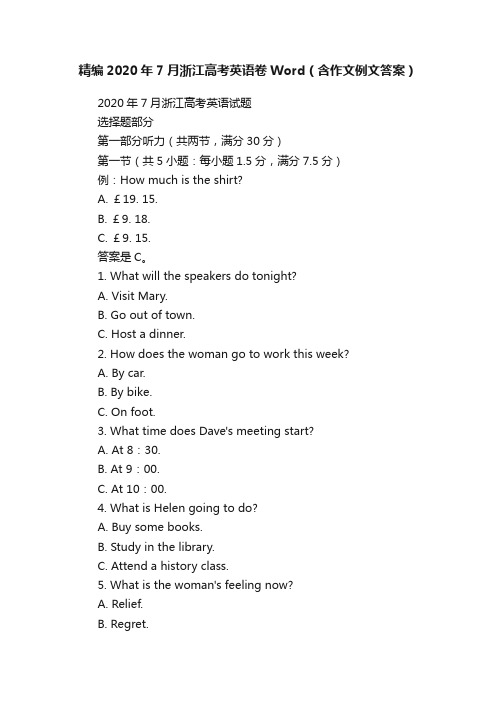
精编2020年7月浙江高考英语卷Word(含作文例文答案)2020年7月浙江高考英语试题选择题部分第一部分听力(共两节,满分30分)第一节(共5小题:每小题1.5分,满分7.5分)例:How much is the shirt?A. £19. 15.B. £9. 18.C. £9. 15.答案是C。
1. What will the speakers do tonight?A. Visit Mary.B. Go out of town.C. Host a dinner.2. How does the woman go to work this week?A. By car.B. By bike.C. On foot.3. What time does Dave's meeting start?A. At 8:30.B. At 9:00.C. At 10:00.4. What is Helen going to do?A. Buy some books.B. Study in the library.C. Attend a history class.5. What is the woman's feeling now?A. Relief.B. Regret.C. Embarrassment.第二节(共15小题;每小题1.5分,满分22.5分)听第6段材料,回答第6、7题。
6. What is Tom busy doing?A. Raising money.B. Writing a lab report.C. Giving classes to children.7. Who might be able to help T om this week?A. Mike.B. Cathy.C. Jane.听第7段材料,回答第8至10题。
8. Why is Jack leaving early?A. To avoid getting stuck in traffic.B. To enjoy the scenery on the way.C. To buy some gifts for his family.9. What does Judy often do at the railway station?A. Read books.B. Call some friends.C. Look around the shops.10. What are the speakers mainly talking about?A. What to do next year.B. Where to go for vacations.C. How to pass the waiting time. 听第8段材料,回答第11至13题。
2020年全国新高考英语浙江卷含答案-全
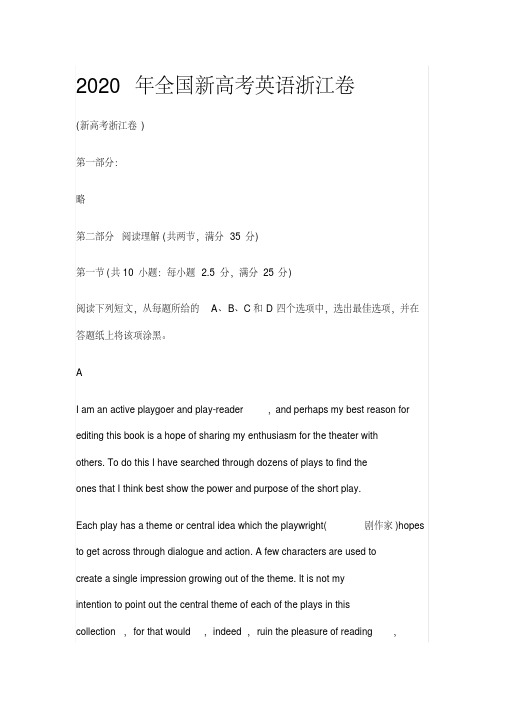
2020年全国新高考英语浙江卷(新高考浙江卷)第一部分:略第二部分阅读理解(共两节,满分35分)第一节(共10小题:每小题 2.5分,满分25分)阅读下列短文,从每题所给的A、B、C和D四个选项中,选出最佳选项,并在答题纸上将该项涂黑。
AI am an active playgoer and play-reader,and perhaps my best reason for editing this book is a hope of sharing my enthusiasm for the theater withothers. To do this I have searched through dozens of plays to find theones that I think best show the power and purpose of the short play.Each play has a theme or central idea which the playwright(剧作家)hopes to get across through dialogue and action. A few characters are used tocreate a single impression growing out of the theme. It is not myintention to point out the central theme of each of the plays in thiscollection,for that would,indeed,ruin the pleasure of reading,discussing,and thinking about the plays and the effectiveness of the playwright. However,a variety of types is represented here. Theseinclude comedy,satire,poignant drama,historical and regional drama.To show the versatility(多面性)of the short play,I have included a guidance play,a radio play and a television play.Among the writers of the plays in this collection,Paul Green,Susan Glaspell,Maxwell Anderson,Thornton Wilder,William Saroyan,and Tennessee Williams have all received Pulitzer Prizes for theircontributions to the theater. More information about the playwrights willbe found at the end of this book.To get the most out of reading these plays,try to picture the play on stage,with you,the reader,in the audience. The houselights dim(变暗). The curtains are about to open,and in a few minutes the action and dialogue will tell you the story.21. What do we know about the author from the first paragraph?A. He has written dozens of plays.B. He has a deep love for the theater.C. He is a professional stage actor.D. He likes reading short plays to others.22. What does the author avoid doing in his work?A. Stating the plays' central ideas.B. Selecting works by famous playwrights.C. Including various types of plays.D. Offering information on the playwrights.23. What does the author suggest readers do while reading the plays?A. Control their feelings.B. Apply their acting skills.C. Use their imagination.D. Keep their audience in mind.24. What is this text?A. A short story.B. An introduction to a book.C. A play review.D. An advertisement for a theater.BThe traffic signals along Factoria Boulevard in Bellevue,Washington,generally don't flash the same length of green twice in a row,especially at rush hour. At9:30am,the full red/yellow/green signal cycle might be140 seconds. By 9:33am,a burst of additional traffic might push it to 145 seconds. Less traffic at 9:37am could push it down to 135. Just like thetraffic itself,the timing of the signals changes.That is by design. Bellevue,a fast-growing city,just east of Seattle,uses a system that is gaining popularity around the US:intersection(十字路口)signals that can adjust in real time to traffic conditions. These lights,known as adaptive signals,have led to significant declines in both thetrouble and cost of travels between work and home.“Adaptive signals can make sure that the traffic demand that is there isbeing addressed,”says Alex Stevanovic,a researcher at Florida Atlantic University.For all of Bellevue's success,adaptive signals are not a cure-all forjammed roadways. Kevin Balke,a research engineer at the Texas A&M University Transportation Institute,says that while smart lights can be particularly beneficial for some cities,others are so jammed that only a sharp reduction in the number of cars on the road will make ameaningful difference. “It's not going to fix everything, but adaptive signals have some benefits for smaller cities,”he says.In Bellevue, the switch to adaptive signals has been a lesson in the valueof welcoming new approaches. In the past, there was often an automatic reaction to increased traffic: just widen the roads, says Mark Poch, the Bellevue Transportation Department's traffic engineering manager. Nowhe hopes that other cities will consider making their streets run smarter instead of just making them bigger.25. What does the underlined word “that”in paragraph 2 refer to?A. Increased length of green lights.B. Shortened traffic signal cycle.C. Flexible timing of traffic signals.D. Smooth traffic flow on the road.26. What does Kevin Balke say about adaptive signals?A. ' They work better on broad roads.B. They should be used in other cities.C. They have greatly reduced traffic on the road.D. They are less helpful in cities seriously jammed.27. What can we learn from Bellevue's success?A. It is rewarding to try new things.B. The old methods still work today.C. I pays to put theory into practice.D. The simplest way is the best way.CChallenging work that requires lots of analytical thinking,planning and other managerial skills might help your brain stay sharp as you age,a study published Wednesday in the journal Neurology suggests.Researchers from the University of Leipzig in Germany gathered morethan 1,000 retired workers who were over age 75 and assessed thevolunteers' memory and thinking skills through a battery of tests. Then,for eight years,the scientists asked the same group to come back to thelab every 18 months to take the same sorts of tests.Those who had held mentally stimulating(刺激),demanding jobs before retirement tended to do the best on the tests. And they tended to losecognitive(认知)function at a much slower rate than those with the leastmentally challenging jobs. The results held true even after the scientists accounted for the participants' overall health status.“This works just like physical exercise,”says Francisca Then,who led the study. “After a long run,you may feel like you're in pain,you may feel tired. But it makes you fit. After a long day at work-sure,you will feel tired,but it can help your brain stay healthy. ”It's not just corporate jobs,or even paid work that can help keep yourbrain fit,Then points out. A waiter's job,for example,that requires multitasking,teamwork and decision-making could be just asstimulating as any high-level office work. And “running a family household requires high-level planning and coordinating(协调),”she says. “You have to organize the activities of the children and take care ofthe bills and groceries.Of course,our brains can decline as we grow older for lots ofreasons-including other environmental influences or genetic factors.Still,continuing to challenge yourself mentally and keeping your mindbusy can only help.28. Why did the scientists ask the volunteers to take the tests?A. To assess their health status.B. To evaluate their work habits.C. To analyze their personality.D. To measure their mental ability.29. How does Francisca Then explain her findings in paragraph 4?A. By using an expert's words.B. By making a comparison.C. By referring to another study.D. By introducing a concept.30. Which of the following is the best title for the text?A. Retired Workers Can Pick Up New SkillsB. Old People Should Take Challenging JobsC. Your Tough Job Might Help Keep You SharpD. Cognitive Function May Decline As You Age第二节(共5小题;每小题2分,满分10分)根据短文内容,从短文后的选项中选出能填入空白处的最佳选项。
2020年高考英语浙江卷(7月选考)附答案解析版
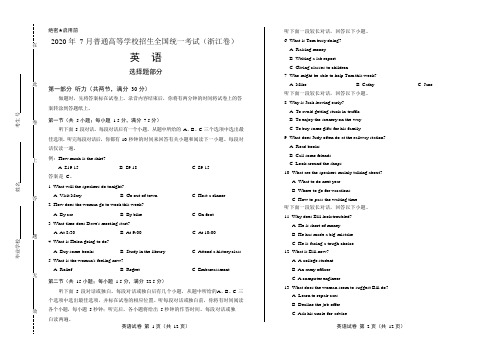
英语试卷 第 1 页(共 12 页)英语试卷 第 2 页(共 12 页)考生号绝密★启用前2020 年 7 月普通高等学校招生全国统一考试(浙江卷)英 语选择题部分第一部分 听力(共两节,满分 30 分)做题时,先将答案标在试卷上。
录音内容结束后,你将有两分钟的时间将试卷上的答案转涂到答题纸上。
第一节(共 5 小题;每小题 1.5 分,满分 7.5 分)听下面 5 段对话。
每段对话后有一个小题,从题中所给的 A 、B 、C 三个选项中选出最佳选项。
听完每段对话后,你都有 10 秒钟的时间来回答有关小题和阅读下一小题。
每段对话仅读一遍。
例:How much is the shirt?A. £19.15.B. £9.18.C. £9.15.答案是 C 。
1. What will the speakers do tonight?A. Visit Mary.B. Go out of town.C. Host a dinner.2. How does the woman go to work this week? A. By car.B. By bike.C. On foot.3. What time does Dave's meeting start?A. At 8:30.B. At 9:00.C. At 10:00.4. What is Helen going to do? A. Buy some books.B. Study in the library.C. Attend a history class.5. What is the woman's feeling now?A. Relief.B. Regret.C. Embarrassment.第二节(共 15 小题;每小题 1.5 分,满分 22.5 分)听下面 5 段对话或独白。
每段对话或独白后有几个小题,从题中所给的A 、B 、C 三个选项中选出最佳选项,并标在试卷的相应位置。
2020年普通高等学校招生全国统一考试英语试题(浙江卷,解析版)

2020年普通高等学校招生全国统一考试英语(浙江卷,解析版)本试题卷分选择题和非选择题两部分。
全卷共12页,先择题部分1至10页,非选择题部分11至12页。
满分120分,考试120分钟。
请考生按规定用笔将所有试题的答案涂、写在答题纸上。
选择题部分(共80分)注意事项:1.答题前,老先生务必将自己的姓名、准考证号用黑色字迹的签字笔或钢笔填写在答题纸上。
2.每小题选出答案后,用2B铅笔把答题纸上对应题目的答案标号涂黑。
如需改动,用橡皮擦干净后,再先涂其他答案标号。
不能答在试题卷上。
第一部分:英语知识(共两节,满分30分)第一节:单项填空(共20小题 ;每小题0.5分,满分10分)从A、B、C和D四个选项中,迁出可以填入空白处的最佳选项,并在答题纸上将该选项标号涂黑。
1.-Hey, you haven’t been acting like yourself, Everything OK?-______.A.I’m fine, thanksB. Sure, it isC. That’s goodD. It’s OK【答案】A【解析】考查情景交际。
俩人对话上句意思为"你一直表现得不像你本人,还好吧?用第二人称,答语肯定用第一人称“--------我很好”。
由人称可以排除B,D;而C 项答所非问,选A.2.I don’t understand what the engineer means, but I’ve got ______ rough idea of _____ project plan.A. the; aB. 不填; theC. the; 不填D. a; the 【答案】D【解析】考查冠词基本用法。
前空泛指一种大体的想法,后空指双双都知道的那个project 计划,选D。
3._______and short of breath, Andy and Ruby were the first to reach the top of Mount Tai.A. the; aB. TiredC. TiringD. Being tired【答案】 B【解析】考查形容词做伴随状语。
2020年浙江高考英语试卷

2020年浙江省高考英语试卷AI am an active playgoer and play-reade,r and perhaps my best reason for editing this book is a hope of sharing my enthusiasm for the theater with other.s To do this I have searched through dozens of plays to find the ones that I think best show the power and purpose of the short pla.yEach play has a theme or central idea which the playwright (剧作家)hopes to get across through dialogue and action.A few characters are used to create a single impression growing out of the theme.It is not my intention to point out the central theme of each of the plays in this collection,for that would,indeed,ruin the pleasure of reading,discussing,and thinking about the plays and the effectiveness of the playwright.However,a variety of types is represented here.These include comedy,satire,poignant drama,historical and regional drama.To show the versatility (多面性)of the short play, I have included a guidance play a radio play and a television play.Among the writers of the plays in this collection,Paul Green,Susan Glaspell,Maxwell Anderson,Thornton Wilder,William Saroyan,and Tennessee Williams have all received Pulitzer Prizes for their contributions to the theater.More information about the playwrights will be found at the end of this book.To get the most out of reading these plays,try to picture the play on stage,with you,the reader, in the audience. The houselights dim (变暗).The curtains are about to open and in a few minutes the action and dialogue will tell you the story.1.What do we know about the author from the first paragraphA.He has written dozens of plays.B.He has a deep love for the theater.C.He is a professional stage actor.D.He likes reading short plays to others.2.What does the author avoid doing in his work?A.Stating the plays' central ideas.B.Selecting works by famous playwrights.C.Including various types of plays.D.Offering information on the playwrights.3.What does the author suggest readers do while reading the playsA. Control their feelings .B. Apply their acting skills .C. Use their imagination.D. Keep their audience in mind.4.What is this text?A. A short story.B.An introduction to a book.C. A play review.D.An advertisement for a theater.The traffic signals along Factoria Boulevard in Bellevue Washington, generally don't flash the same length of green twice in a row,especially at rush hour.At 9:30am,the full red/yellow/green signal cycle might be 140 second.s By 9:33am,a burst of additional traffic might push it to 145 seconds.Less traffic at 9:37am could push it down to 135.Just like the traffic itself,the timing of the signals changes.That is by design. Bellevue, a fast-growing city just east of Seattle, uses a system that is gaining popularity around the US intersection (十字路口)signals that can adjust in real time to traffic conditions.These lights,known as adaptive signals,have led to significant declines in both the trouble and cost of travels between work and home."Adaptive signals can make sure that the traffic demand that is there is being addressed," says Alex Stevanovic,a researcher at Florida Atlantic University.For all of Bellevue's success, adaptive signals are not a cure all for jammedroadways .Kevin Balke,a research engineer at the Texas A&M University Transportation Institute,says that while smart lights can be particularly beneficial for some citie,s others are so jammed that only a sharp reduction in the number of cars on the road will make a meaningful difference. "It's not going to fix everything,but adaptive signals have some benefits for smaller cities," he says .In Bellevue,the switch to adaptive signals has been a lesson in the value of welcoming new approaches.In the past,there was often an automatic reaction to increased traffi:c just widen the roads,says Mark Poch,the Bellevue Transportation Department's traffic engineering manager.Now he hopes that other cities will consider making their streets run smarter instead of just making them bigger.5.What does the underlined word "that" in paragraph 2 refer toA.Increased length of green lights.B.Shortened traffic signal cycle.C.Flexible timing of traffic signals.D.Smooth traffic flow on the road.6.What does Kevin Balke say about adaptive signals?A.They work better on broad roads .B.They should be used in other cities.C.They have greatly reduced traffic on the road.D.They are less helpful in cities seriously jammed.7.What can we learn from Bellevue's success?A.It is rewarding to try new things.B.The old methods still work today.C.It pays to put theory into practice.D.The simplest way is the best way.CChallenging work that requires lots of analytical thinking,planning and other managerial skillsmight help your brain stay sharp as you ag,e a study published Wednesday in the journal Neurology suggests .Researchers from the University of Leipzig in Germany gathered more than 1,000 retired workers who were over age 75 and assessed the volunteers' memory and thinking skills through a battery of tests.Then,for eight years,the scientists asked the same group to come back to the lab every 18 months to take the same sorts of tests.Those who had held mentally stimulating^ 刺激),demanding jobs before retirement tended to do the best on the tests And they tended to lose cognitive(认知)function at a much slower rate than those with the least mentally challenging jobs.The results held true even after the scientists accounted for the participants' overall health status."This works just like physical exercise," says Francisca Then,who led the study."After a long run,you may feel like you're in pain,you may feel tired.But it makes you fit.After a long day at work—sure,you will feel tired,but it can help your brain stay healthy."It's not just corpo rate jobs,or even paid work that can help keep your brain f.it Then points out.A waiter's job,for example,that requires multitasking,teamwork and decision-making could be just as stimulating as any high-level office work.And "running a family household requires high-level planning and coordinating (协调),"she says. "You have to organize the activities of the children and take care of the bills and groceries."Of course,our brains can decline as we grow older for lots of reasons—including other environmental influences or genetic factors.Still,continuing to challenge yourself mentally and keeping your mind busy can only help.8.Why did the scientists ask the volunteers to take the tests?A.To assess their health status .B.To evaluate their work habits.C.To analyze their personality.D.To measure their mental ability.9.How does Francisca Then explain her findings in paragraph 4?A.By using an expert's words .B.By making a comparison.C.By referring to another study.D.By introducing a concept.10.Which of the following is the best title for the text?A.Retired Workers Can Pick Up New SkillsB.Old People Should Take Challenging JobsC.Your Tough Job Might Help Keep You SharpD.Cognitive Function May Decline As You Age 二、阅读七选五(本大题共5小题,共10.0分)I experienced years of loneliness as a child.(1) ______ His friends teased him about babysitting his sister and his interests were far different from mine.With no other kids of my age in the neighborhood,I had to spend hours by myself.A bright spot for me turned out to be readin.gMy love of the written word began early as my mother read to me every evening.(2)_____ I started reading books on my own before age 5and my mother took me to the public library once a week to borrow several books.I quickly graduate d from typical children's books to ones with fewer pictures and longer chapters.Reading opened new worlds to me.(3) _____________________My mother also encouraged me to make what I wanted.I tried making toy cars with cardboard boxes and constructing buildings from leftover cardboard and bits of wood my father gave me.When my mother saw my creations,she told me how creative my designs were.(4)I learned a lot about how to extend the life of objects and transform them into something new and useful. It was a trait (特点)others found helpful, and I soon had friends who wanted to make things with me.(5)My parents made it a point for their two kids to spend time outsid,eno matter the weather or season.My brother,of course,raced off to be with his friends,while I had plenty to do myself.There was making leaf houses in autumn,ice skating in winter,and so much more .They're all memories I treasure today.11. A. I wasn't alone any longer.B.I enjoyed reading stories aloud.C.I was invited to play with another kid.D.I loved the colorful photographs in the books.E.Another habit I formed early was being outdoors.F.Thus,I began my lifelong interest in making things.G.My older brother couldn't be bothered to play with me.12. A. I wasn't alone any longer.B.I enjoyed reading stories aloud.C.I was invited to play with another kid.D.I loved the colorful photographs in the books.E.Another habit I formed early was being outdoors.F.Thus,I began my lifelong interest in making things.G.My older brother couldn't be bothere d to play with me.13. A. I wasn't alone any longer.B.I enjoyed reading stories aloud.C.I was invited to play with another kid.D.I loved the colorful photographs in the books.E.Another habit I formed early was being outdoors.F.Thus,I began my lifelong interest in making things.G.My older brother couldn't be bothered to play with me.14. A. I wasn't alone any longer.B.I enjoyed reading stories aloud.C.I was invited to play with another kid.D.I loved the colorful photographs in the books.E.Another habit I formed early was being outdoors.F.Thus,I began my lifelong interest in making things.G.My older brother couldn't be bothered to play with me.15. A. I wasn't alone any longer.B.I enjoyed reading stories aloud.C.I was invited to play with another kid.D.I loved the colorful photographs in the books.E.Another habit I formed early was being outdoors.F.Thus,I began my lifelong interest in making things.G.My older brother couldn't be bothered to play with me. 三、完形填空(本大题共20小题,共30.0分)I've been farming sheep on a hillside for 54 year.s I use a small tractor to get abou.t My dog Don always sits beside me in the passenger seat.One morning (I 1) _ a lost lamb when I was in the top fiel,d near where a motorway cuts through my land.The lamb had become separated from its(2) ______ ,so I jumped out of the tractor to(3)___ it while Don stayed in his seat.Lamb and mother(4) ____ ,I turned back to the tractor only to see it move suddenly away from me.This was so(5)___ because I had put the handbrake on when I jumped ou.t(6)____ D on had somehow made the(7)_____ move.My heart froze in my chest as I(8)____ the tractor heading towards the(9) ____ .I ran desperately but failed to(10)___ .It crashed through a wooden fence and disappeared.The (11)___ t hing I saw was Don's face,looking calmly back at me.Heart in mouth,I(12)__ the fence and looked over.The tractor was(13) _____ againstthe crash barrier in the central reservation having miraculously (奇迹般地)crossed the(14)____ r oad with fast-flowing traffic. I couldn't see Don,but as I(15) _ the tractor he jumped out onto the road,apparently(16)_________________________________ ,and dashed back to me.The police(17)____ and the motorway ran normally again.I couldn't quite believe my (18)_ it turned out no one got badly hur,tbut the outcome could have bee(n 19) __ .Donwas given a special(20) ____ that night—I didn't want him thinking I was angry with him .16. A. dropped B. spotted C. carried D. returned17. A. kids B. friends C. owner D. mother18. A. ask about B. play with C. tend to D. run into19. A. freed B. switched C. reunited D. examined20. A. unexpected B. dangerous C. embarrassing D. difficult21. A. Fortunately B. Generally C. Immediately D. Obviously22. A. lamb B. vehicle C. seat D. fence23. A. saw B. stopped C. remembered D. drove24. A. crowd B. motorway C. field D. hill25. A. take off B. catch up C. hold back D. get out26. A. real B. best C. basic D. last27. A. fixed B. noticed C. reached D. closed28. A. resting B. running C. parking D. turning29. A. sleep B. long C. rough D. busy30. A. abandoned B. approached C. recognized D. repaired31. A. unclean B. uncertain C. unhurt D. unhappy32. A. arrived B. replied C. survived D. waited33. A. ability B. dream C. luck D. idea34. A. common B. confusing C. desirable D. awful35. A. meal B. test C. job D. lesson四、语法填空(本大题共1小题,共15.0分)36. Some time after 10,000 BC,people made the first real attempt to control the world they lived(1) ___________ ,through agriculture. Over thousands of years,they began to depend less on(2) __ could be hunted or gathered from the wild,and more on animals they hadraised and crops they had sown.Farming produced more food per person(3) _____ hunting and gathering,so people were able to raise more children.And,as more children were born,more food(4) ___ (need).Agriculture gave people their first experience of the power of technolog(y 5)___ (change)lives.By about 6000 BC,people(6)_____ (discover)the best crops to grow and animals to raise.Later,they learned to work with the(7) ____ (season),planting at the right time and, in dry areas, (8)(make)use of annual floods to irrigate(灌溉)their fields.This style of farming lasted for quite a long tim.eThen,with(9)__ rise of science, changes began.New method(s 10) _ (mean)that fewer people worked in farming.In the last century or so,these changes have accelerated.New power machinery and artificial fertilizers (化肥)have now totally transformed a way of life that started in the Stone Age.五、书面表达(本大题共2小题,共40.0分)37.假定你是李华,你校来自爱尔兰的外教Peter因病回国休假。
2020年高考英语浙江卷(7月选考)-答案

2020年7月普通高等学校招生全国统一考试(浙江卷)英语答案解析选择题部分第一部分听力1.【答案】C【解析】本题为听力题,解析略。
2.【答案】A【解析】本题为听力题,解析略。
3.【答案】B【解析】本题为听力题,解析略。
4.【答案】B【解析】本题为听力题,解析略。
5.【答案】A【解析】本题为听力题,解析略。
6.【答案】A【解析】本题为听力题,解析略。
7.【答案】B【解析】本题为听力题,解析略。
8.【答案】A【解析】本题为听力题,解析略。
9.【答案】C【解析】本题为听力题,解析略。
10.【答案】C【解析】本题为听力题,解析略。
11.【答案】C【解析】本题为听力题,解析略。
12.【答案】A【解析】本题为听力题,解析略。
13.【答案】B【解析】本题为听力题,解析略。
14.【答案】B【解析】本题为听力题,解析略。
15.【答案】C【解析】本题为听力题,解析略。
16【答案】A【解析】本题为听力题,解析略。
17.【答案】C【解析】本题为听力题,解析略。
18.【答案】A【解析】本题为听力题,解析略。
19.【答案】C【解析】本题为听力题,解析略。
20.【答案】B【解析】本题为听力题,解析略。
第二部分阅读理解21.【答案】B【解析】根据文章第一段内容“…and perhaps my best reason for editing this book is a hope of sharing my enthusiasm for the theater with others”可知,作者编辑这本书的最好的原因是希望与他人分享对戏剧的热情,因此可知作者对于戏剧饱含热情。
故选B项。
【考点】细节理解22.【答案】A【解析】根据文章第二段内容“It is not my intention to point out the central theme of each of the plays in this collection, for that would, indeed, ruin the pleasure of reading, discussing, and thinking about the plays and the effectiveness of the playwright.”可知,作者并不想指出这本书中每一部戏剧的中心主题,因为那样确实会破坏阅读、讨论和思考戏剧以及剧作家的有效性的乐趣。
2020年浙江省高考英语试卷【word版本;可编辑;含答案】
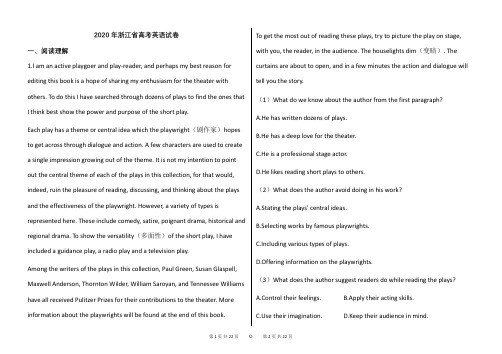
2020年浙江省高考英语试卷一、阅读理解1.I am an active playgoer and play-reader, and perhaps my best reason for editing this book is a hope of sharing my enthusiasm for the theater with others. To do this I have searched through dozens of plays to find the ones that I think best show the power and purpose of the short play.Each play has a theme or central idea which the playwright(剧作家)hopes to get across through dialogue and action. A few characters are used to create a single impression growing out of the theme. It is not my intention to point out the central theme of each of the plays in this collection, for that would, indeed, ruin the pleasure of reading, discussing, and thinking about the plays and the effectiveness of the playwright. However, a variety of types is represented here. These include comedy, satire, poignant drama, historical and regional drama. To show the versatility(多面性)of the short play, I have included a guidance play, a radio play and a television play.Among the writers of the plays in this collection, Paul Green, Susan Glaspell, Maxwell Anderson, Thornton Wilder, William Saroyan, and Tennessee Williams have all received Pulitzer Prizes for their contributions to the theater. More information about the playwrights will be found at the end of this book. To get the most out of reading these plays, try to picture the play on stage, with you, the reader, in the audience. The houselights dim(变暗). The curtains are about to open, and in a few minutes the action and dialogue will tell you the story.(1)What do we know about the author from the first paragraph?A.He has written dozens of plays.B.He has a deep love for the theater.C.He is a professional stage actor.D.He likes reading short plays to others.(2)What does the author avoid doing in his work?A.Stating the plays' central ideas.B.Selecting works by famous playwrights.C.Including various types of plays.D.Offering information on the playwrights.(3)What does the author suggest readers do while reading the plays? A.Control their feelings. B.Apply their acting skills.e their imagination.D.Keep their audience in mind.(4)What is this text?A.A short story.B.An introduction to a book.C.A play review.D.An advertisement for a theater.2.The traffic signals along Factoria Boulevard in Bellevue, Washington, generally don't flash the same length of green twice in a row, especially at rush hour. At 9:30 am, the full red/yellow/green signal cycle might be 140 seconds. By 9:33 am, a burst of additional traffic might push it to 145 seconds. Less traffic at 9:37am could push it down to 135. Just like the traffic itself, the timing of the signals changes.That is by design. Bellevue, a fast-growing city, just east of Seattle, uses a system that is gaining popularity around the US: intersection(十字路口)signals that can adjust in real time to traffic conditions. These lights, known as adaptive signals, have led to significant declines in both the trouble and cost of travels between work and home."Adaptive signals can make sure that the traffic demand that is there is being addressed," says Alex Stevanovic, a researcher at Florida Atlantic University. For all of Bellevue's success, adaptive signals are not a cure-all for jammed roadways. Kevin Balke, a research engineer at the Texas A&M University Transportation Institute, says that while smart lights can be particularly beneficial for some cities, others are so jammed that only a sharp reduction in the number of cars on the road will make a meaningful difference. "It's not going to fix everything, but adaptive signals have some benefits for smaller cities," he says.In Bellevue, the switch to adaptive signals has been a lesson in the value of welcoming new approaches. In the past, there was often an automatic reaction to increased traffic: just widen the roads, says Mark Poch, the Bellevue Transportation Department's traffic engineering manager. Now he hopes that other cities will consider making their streets run smarter instead of just making them bigger.(1)What does the underlined word "that" in paragraph 2 refer to?A.Increased length of green lights.B.Shortened traffic signal cycle.C.Flexible timing of traffic signals.D.Smooth traffic flow on the road.(2)What does Kevin Balke say about adaptive signals?A.They work better on broad roads.B.They should be used in other cities.C.They have greatly reduced traffic on the road.D.They are less helpful in cities seriously jammed.(3)What can we learn from Bellevue's success?A.It is rewarding to try new things.B.The old methods still work today.C.I pays to put theory into practice.D.The simplest way is the best way.3.Challenging work that requires lots of analytical thinking, planning and other managerial skills might help your brain stay sharp as you age, a study published Wednesday in the journal Neurology suggests.Researchers from the University of Leipzig in Germany gathered more than 1,000 retired workers who were over age 75 and assessed the volunteers' memory and thinking skills through a battery of tests. Then, for eight years, the scientists asked the same group to come back to the lab every 18 months to take the same sorts of tests.Those who had held mentally stimulating(刺激), demanding jobs before retirement tended to do the best on the tests. And they tended to lose cognitive(认知)function at a much slower rate than those with the least mentally challenging jobs. The results held true even after the scientists accounted for the participants' overall health status."This works just like physical exercise," says Francisca Then, who led the study. "After a long run, you may feel like you're in pain, you may feel tired. But it makes you fit. After a long day at work-sure, you will feel tired, but it can help your brain stay healthy."It's not just corporate jobs, or even paid work that can help keep your brain fit, Then points out. A waiter's job, for example, that requires multitasking, teamwork and decision-making could be just as stimulating as any high-level office work. And "running a family household requires high-level planning and coordinating(协调)," she says. "You have to organize the activities of the children and take care of the bills and groceries."Of course, our brains can decline as we grow older for lots of reasons-including other environmental influences or genetic factors. Still, continuing to challenge yourself mentally and keeping your mind busy can only help.。
2020年浙江省高考英语试卷及答案解析
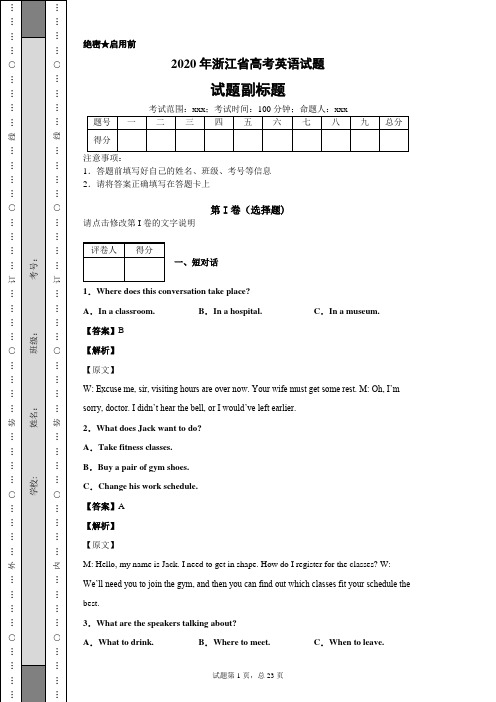
绝密★启用前2020年浙江省高考英语试题试题副标题注意事项:1.答题前填写好自己的姓名、班级、考号等信息 2.请将答案正确填写在答题卡上第I 卷(选择题)请点击修改第I 卷的文字说明 一、短对话1.Where does this conversation take place? A .In a classroom. B .In a hospital.C .In a museum.【答案】B 【解析】 【原文】W: Excuse me, sir, visiting hours are over now. Your wife must get some rest. M: Oh, I’m sorry, doctor. I didn’t hear the bell, or I would’ve left earlier. 2.What does Jack want to do? A .Take fitness classes. B .Buy a pair of gym shoes. C .Change his work schedule. 【答案】A 【解析】 【原文】M: Hello, my name is Jack. I need to get in shape. How do I register for the classes? W: We’ll need you to join the gym, and then you can find out which classes fit your schedule the best.3.What are the speakers talking about? A .What to drink.B .Where to meet.C .When to leave.试题第2页,总23页【答案】B 【解析】 【原文】W: I’ll see you at the theatre. M: Better still, let’s meet in the Red Lion bar to have a little nice talk. W: Good idea, and I’d love to have a drink there . 4.What is the relationship between the speakers? A .Colleges. B .Classmates. C .Strangers.【答案】C 【解析】 【原文】M: Hello, my name is John Arber. And I’m calling to ask about the position advertised in Friday’s Dailymail. W: Yes, the position is still open. You c ould come over and have a talk with us.5.Why is Emily mentioned in the conversation? A .She might want a ticket. B .She is looking for the man. C .She has an extra ticket. 【答案】A 【解析】 【原文】M: I have an extra ticket to the concert tonight. Would you like to join me? W: Thanks, but I already have one. You can ask Emily. She might be interested. 二、长对话听下面一段较长对话,回答以下小题。
2020年全国统一高考英语试题(浙江卷)真题(Word版+答案+解析)

21.What do we know about the author from the first paragraph?
A.He has written dozens of plays.B.He has a deep love for the theater.
C.He is a professional stage actor.D.He likes reading short plays to others.
2020年全国统一高考英语试题(浙江卷)
选择题部分
第一部分听力(共两节,满分30分)
做题时,先将答案标在试卷上。录音内容结束后,你将有两分钟的时间将试卷上的答案转涂到答题纸上。
第一节(共5小题:每小题1.5分,满分7.5分)
听下面5段对话。每段对话后有一个小题,从题中所给的A、B、C三个选项中选出最佳选项,并标在试卷的相应位置。听完每段对话后,你都有10秒钟的时间来回答有关小题和阅读下一小题。每段对话仅读一遍。
第一节(共10小题:每小题2.5分,满分25分)
阅读下列短文,从每题所给的A、B、C和D四个选项中,选出最佳选项,并在答题纸上将该项涂黑。
A
I am an active playgoer and play-reader, and perhaps my best reason for editing this book is a hope of sharing my enthusiasm for the theater with others. To do this I have searched through dozens of plays to find the ones that I think best show the power and purpose of the short play.
2020年浙江高考英语试题附答案
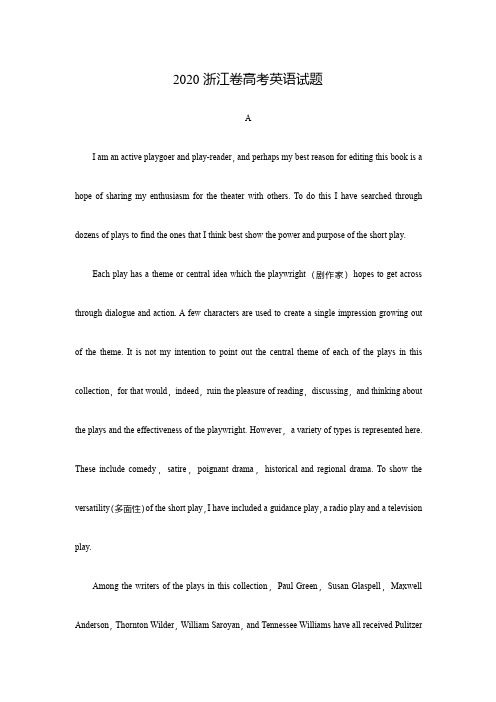
2020浙江卷高考英语试题AI am an active playgoer and play-reader,and perhaps my best reason for editing this book is a hope of sharing my enthusiasm for the theater with others.To do this I have searched through dozens of plays to find the ones that I think best show the power and purpose of the short play.Each play has a theme or central idea which the playwright(剧作家)hopes to get across through dialogue and action.A few characters are used to create a single impression growing out of the theme.It is not my intention to point out the central theme of each of the plays in this collection,for that would,indeed,ruin the pleasure of reading,discussing,and thinking about the plays and the effectiveness of the playwright.However,a variety of types is represented here. These include comedy,satire,poignant drama,historical and regional drama.To show the versatility(多面性)of the short play,I have included a guidance play,a radio play and a television play.Among the writers of the plays in this collection,Paul Green,Susan Glaspell,Maxwell Anderson,Thornton Wilder,William Saroyan,and Tennessee Williams have all received Pulitzer。
浙江省2020年普通高等学校招生全国统一考试英语试题及答案
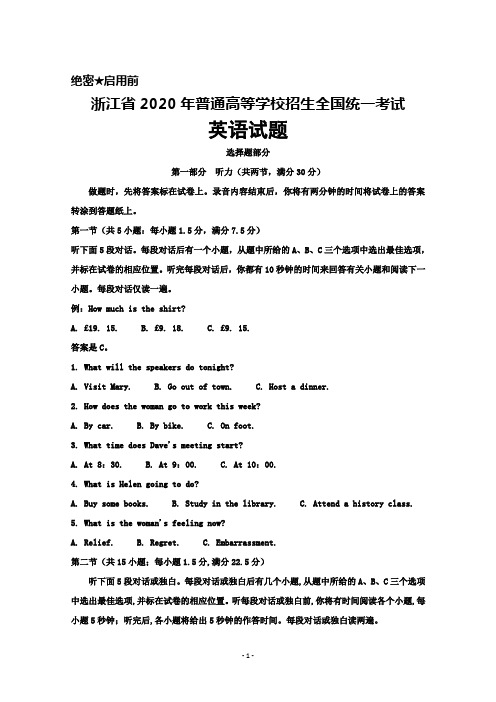
绝密★启用前浙江省2020年普通高等学校招生全国统一考试英语试题选择题部分第一部分听力(共两节,满分30分)做题时,先将答案标在试卷上。
录音内容结束后,你将有两分钟的时间将试卷上的答案转涂到答题纸上。
第一节(共5小题:每小题1.5分,满分7.5分)听下面5段对话。
每段对话后有一个小题,从题中所给的A、B、C三个选项中选出最佳选项,并标在试卷的相应位置。
听完每段对话后,你都有10秒钟的时间来回答有关小题和阅读下一小题。
每段对话仅读一遍。
例:How much is the shirt?A. £19. 15.B. £9. 18.C. £9. 15.答案是C。
1. What will the speakers do tonight?A. Visit Mary.B. Go out of town.C. Host a dinner.2. How does the woman go to work this week?A. By car.B. By bike.C. On foot.3. What time does Dave's meeting start?A. At 8:30.B. At 9:00.C. At 10:00.4. What is Helen going to do?A. Buy some books.B. Study in the library.C. Attend a history class.5. What is the woman's feeling now?A. Relief.B. Regret.C. Embarrassment.第二节(共15小题;每小题1.5分,满分22.5分)听下面5段对话或独白。
每段对话或独白后有几个小题,从题中所给的A、B、C三个选项中选出最佳选项,并标在试卷的相应位置。
听每段对话或独白前,你将有时间阅读各个小题,每小题5秒钟;听完后,各小题将给出5秒钟的作答时间。
2020年普通高等学校招生全国统一考试英语试题(浙江卷,解析版)

2020年普通高等学校招生全国统一考试英语(浙江卷,解析版)本试题卷分选择题和非选择题两部分。
全卷共12页,先择题部分1至10页,非选择题部分11至12页。
满分120分,考试120分钟。
请考生按规定用笔将所有试题的答案涂、写在答题纸上。
选择题部分(共80分)注意事项:1.答题前,老先生务必将自己的姓名、准考证号用黑色字迹的签字笔或钢笔填写在答题纸上。
2.每小题选出答案后,用2B铅笔把答题纸上对应题目的答案标号涂黑。
如需改动,用橡皮擦干净后,再先涂其他答案标号。
不能答在试题卷上。
第一部分:英语知识(共两节,满分30分)第一节:单项填空(共20小题 ;每小题0.5分,满分10分)从A、B、C和D四个选项中,迁出可以填入空白处的最佳选项,并在答题纸上将该选项标号涂黑。
1.-Hey, you haven’t been acting like yourself, Everything OK?-______.A.I’m fine, thanksB. Sure, it isC. That’s goodD. It’s OK【答案】A【解析】考查情景交际。
俩人对话上句意思为"你一直表现得不像你本人,还好吧?用第二人称,答语肯定用第一人称“--------我很好”。
由人称可以排除B,D;而C 项答所非问,选A.2.I don’t understand what the engineer means, but I’ve got ______ rough idea of _____ project plan.A. the; aB. 不填; theC. the; 不填D. a; the 【答案】D【解析】考查冠词基本用法。
前空泛指一种大体的想法,后空指双双都知道的那个project 计划,选D。
3._______and short of breath, Andy and Ruby were the first to reach the top of Mount Tai.A. the; aB. TiredC. TiringD. Being tired【答案】 B【解析】考查形容词做伴随状语。
高中-英语-高考-2020年普通高等学校招生全国统一考试(浙江卷)英语

2020年普通高等学校招生全国统一考试(浙江卷)英语非选择题部分第一部分听力(共两节,满分30分)第一节(共5小题:每小题1.5分,满分7.5分)1、听下面5段对话。
每段对话后有一个小题,从题中所给的A、B、C三个选项中选出最佳选项,并标在试卷的相应位置。
听完每段对话后,你都有10秒钟的时间来回答有关小题和阅读下一小题。
每段对话仅读一遍。
例:How much is the shirt?A. £19. 15.B. £9. 18.C. £9. 15.答案是C。
(1)音频链接( )What will the speakers do tonight?A. Visit Mary.B. Go out of town.C. Host a dinner.(2)音频链接( )How does the woman go to work this week?A. By car.B. By bike.C. On foot.(3)音频链接( )What time does Dave's meeting start?A. At 8:30.B. At 9:00.C. At 10:00.(4)音频链接( )What is Helen going to do?A. Buy some books.B. Study in the library.C. Attend a history class.(5)音频链接( )What is the woman's feeling now?A. Relief.B. Regret.C. Embarrassment.第二节(共15小题;每小题1.5分,满分22.5分)2、听下面一段较长对话,回答以下小题。
音频链接(1)( )What is Tom busy doing?A. Raising money.B. Writing a lab report.C. Giving classes to children.(2)( )Who might be able to help Tom this week?A. Mike.B. Cathy.C. Jane.3、听下面一段较长对话,回答以下小题。
2020年浙江卷英语高考试题(含答案)
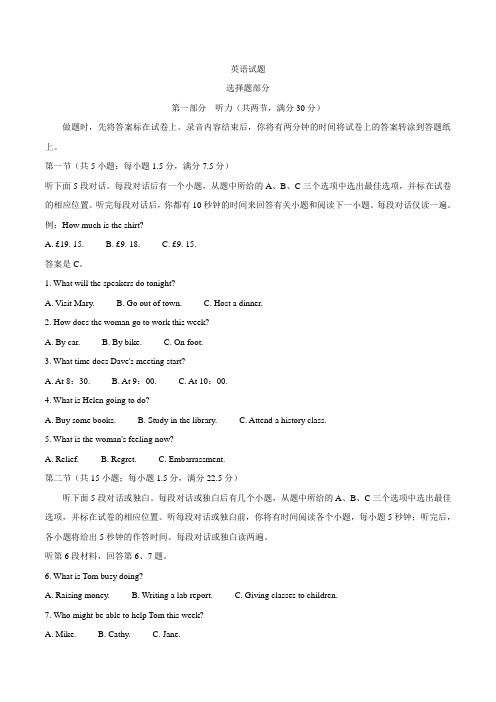
英语试题选择题部分第一部分听力(共两节,满分30分)做题时,先将答案标在试卷上。
录音内容结束后,你将有两分钟的时间将试卷上的答案转涂到答题纸上。
第一节(共5小题:每小题1.5分,满分7.5分)听下面5段对话。
每段对话后有一个小题,从题中所给的A、B、C三个选项中选出最佳选项,并标在试卷的相应位置。
听完每段对话后,你都有10秒钟的时间来回答有关小题和阅读下一小题。
每段对话仅读一遍。
例:How much is the shirt?A. £19. 15.B. £9. 18.C. £9. 15.答案是C。
1. What will the speakers do tonight?A. Visit Mary.B. Go out of town.C. Host a dinner.2. How does the woman go to work this week?A. By car.B. By bike.C. On foot.3. What time does Dave's meeting start?A. At 8:30.B. At 9:00.C. At 10:00.4. What is Helen going to do?A. Buy some books.B. Study in the library.C. Attend a history class.5. What is the woman's feeling now?A. Relief.B. Regret.C. Embarrassment.第二节(共15小题;每小题1.5分,满分22.5分)听下面5段对话或独白。
每段对话或独白后有几个小题,从题中所给的A、B、C三个选项中选出最佳选项,并标在试卷的相应位置。
听每段对话或独白前,你将有时间阅读各个小题,每小题5秒钟;听完后,各小题将给出5秒钟的作答时间。
每段对话或独白读两遍。
2020年浙江省高考英语【7月】(含解析答案版)

2020年全国统一高考英语试题(浙江卷)选择题部分第一部分听力(共两节,满分30分)做题时,先将答案标在试卷上。
录音内容结束后,你将有两分钟的时间将试卷上的答案转 涂到答题纸上。
第一节(共5小题:每小题1.5分,满分7.5分)听下面5段对话。
每段对话后有一个小题,从题中所给的A 、B 、C 三个选项中选出最佳选 项,并标在试卷的相应位置。
听完每段对话后,你都有10秒钟的时间来回答有关小题和阅 读下一小题。
每段对话仅读一遍。
例:How much is the shirt?A. £19. 15.B.£9. 18.C. £9. 15.答案是C 。
1 .What will the speakers do tonight? A. Visit Mary.B. Go out of town.2.How does the woman go to work this week? A. By car.B. By bike. 3.What time does Dave's meeting start?4.What is Helen going to do?class.5.What is the woman's feeling now? 【原文】本题为听力题,解析略。
第二节(共15小题;每小题1.5分,听下面5段对话或独白。
每段对话或独白后有几个小题,从题中所给的A 、B 、C 三个选项 中选出最佳选项,并标在试卷的相应位置。
听每段对话或独白前,你将有时间阅读各个小 题,每小题5秒钟;听完后,各小题将给出5秒钟的作答时间。
每段对话或独白读两遍。
听下面一段较长对话,回答以下小题。
6. What is Tom busy doing?children.7. Who might be able to help Tom this week? B. Cathy. 听下面一段较长对话,回答以下小题。
2020年普通高等学校招生全国统一考试英语试题(浙江卷,含答案)
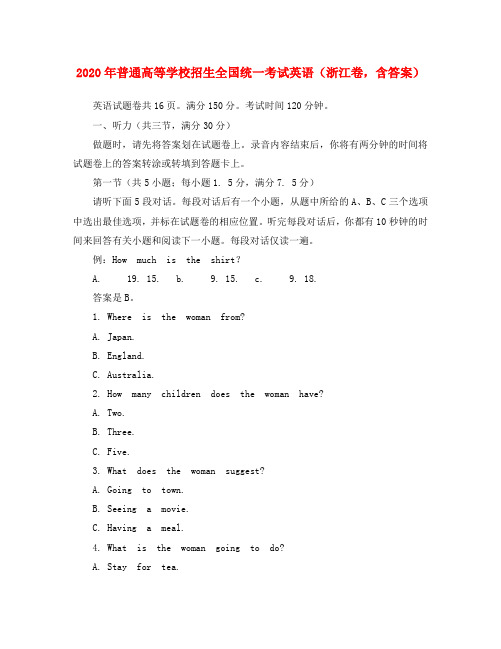
2020年普通高等学校招生全国统一考试英语(浙江卷,含答案)英语试题卷共16页。
满分150分。
考试时间120分钟。
一、听力(共三节,满分30分)做题时,请先将答案划在试题卷上。
录音内容结束后,你将有两分钟的时间将试题卷上的答案转涂或转填到答题卡上。
第一节(共5小题;每小题1. 5分,满分7. 5分)请听下面5段对话。
每段对话后有一个小题,从题中所给的A、B、C三个选项中选出最佳选项,并标在试题卷的相应位置。
听完每段对话后,你都有10秒钟的时间来回答有关小题和阅读下一小题。
每段对话仅读一遍。
例:How much is the shirt?A. 19. 15. b. 9. 15. c. 9. 18.答案是B。
1. Where is the woman from?A. Japan.B. England.C. Australia.2. How many children does the woman have?A. Two.B. Three.C. Five.3. What does the woman suggest?A. Going to town.B. Seeing a movie.C. Having a meal.4. What is the woman going to do?A. Stay for tea.B. Buy some fruits.C. Go back home.5. What is the conversation mainly about?A. The woman’s study.B. The woman’s friend.C. The woman’s trouble.第二节(共12小题;每小题1. 5分,满分18分)请听下面4段对话或独白。
每段对话或独白后有几个小题,从题中所给的A、B、C三个选项中选出最佳选项,并标在试题卷的相应位置。
听每段对话或独白前,你将有时间阅读各小题,每小题5秒钟;听完后,各小题将给出5秒钟的作答时间。
2020年普通高等学校招生全国统一考试英语试题(浙江卷,正式版解析)
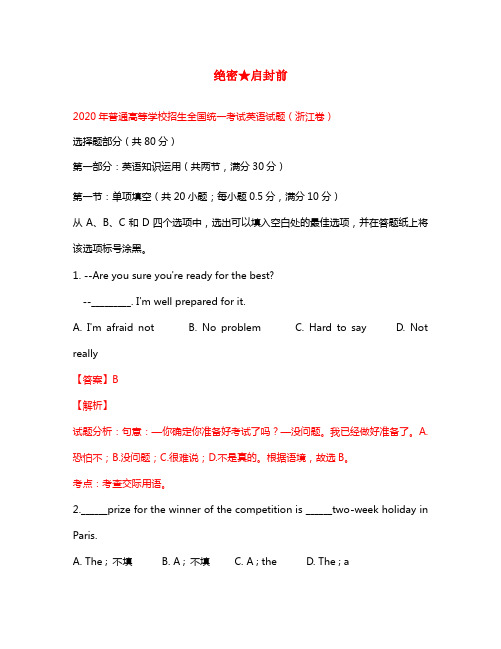
绝密★启封前2020年普通高等学校招生全国统一考试英语试题(浙江卷)选择题部分(共80分)第一部分:英语知识运用(共两节,满分30分)第一节:单项填空(共20小题;每小题0.5分,满分10分)从A、B、C和D四个选项中,选出可以填入空白处的最佳选项,并在答题纸上将该选项标号涂黑。
1. --Are you sure you're ready for the best?--_________. I'm well prepared for it.A. I'm afraid notB. No problemC. Hard to sayD. Not really【答案】B【解析】试题分析:句意:—你确定你准备好考试了吗?—没问题。
我已经做好准备了。
A.恐怕不;B.没问题;C.很难说;D.不是真的。
根据语境,故选B。
考点:考查交际用语。
2.______prize for the winner of the competition is ______two-week holiday in Paris.A. The ; 不填B. A ; 不填C. A ; theD. The ; a【答案】D【解析】试题分析:句意:这个比赛获胜者的奖品是一个巴黎的两个星期的假期。
第一空填the,是特指“获胜者的奖品”,用定冠词,第二空是泛指“一个两周的假期”,用不定冠词a。
故选A。
考点:考查冠词。
3. In many ways , the education system in the US is not very different from ____in the UK.A. thatB. thisC. oneD. it【答案】A考点:考查代词。
4. It is important to pay your electricity bill on time , as late payments may affect your ______.A. conditionB. incomeC. creditD. status 【答案】C【解析】试题分析:句意:准时付电费很重要,因为付晚了会影响你的信用。
